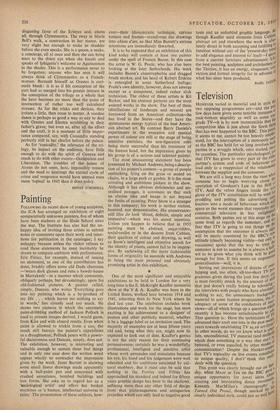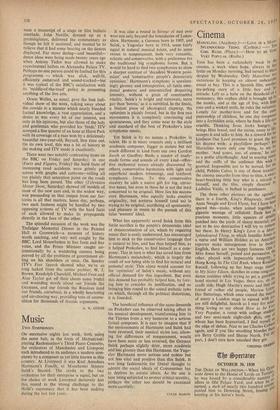Television
HOWEVER varied in material and in style the two opposing programmes are—and the Pi few days have given some notable instances 0' rock-bottom stupidity as well as some top grade TV—it is by now incontestible that the competitive idea is just about the finest thing that has ever happened to the BBC. This pol": it seems to me, cannot be too heavily call% sised, for the interruption of a monopoly suc,,, as the BBC has held for so long involves 1101"t parties in a struggle which, once started, tntisit be ceaseless. The particular psychological I,c'e that ITV has given to every part of the 01°,1 partner's system and code 'of behaviour et lead only to a reappraisal of the relations between the supplier and the consumer. „r, We are still a long way from the time vin,`e someone has to begin. worrying about n'r operation of Gresham's Law in the field °0 ITV. And the velvet fingers inside the ir,.° glove of the ITV constitution -will be used 1°r prodding and patting the advertising el tractors into a mode of behaviour which or spare us the worst excesses that reputedly coed commercial television in less enlighten4 societies. Both parties are at this stage on e same level as regards the customer, and,he fear that ITV is going to run things 00 ,„`lit assumption that the customer always Ilse;
will be neatly countered by the BBC's only attitude (clearly becoming visible—but onlY, ,,'‘.
occasional spots) that the way to treat tit'f, customer is not to assume he is always a 113'd wit to be given what you think will be g0°,5 enough for him. If this seems an ungene generalisation—well, it is. Sorting out impressions of dozens of oleo, lapping and, too often, all-too-short TV Pric grammes given during the 'past few days, °'11 is most forcibly struck by the amount Of st,,°,, that just doesn't really belong to televisinbly the interviews with people who have absolute nothing to say, the unnecessary backgee°,./:i. material to some feature programmes, the,,.r, adequacy of some of the conductors ofni,Tcs views—all of which brings up a question 0'4, recently it has become unfashionable to That question is : Have the technicians of 1e, advanced their craft one iota in the past twe..I1 years towards establishing TV as an art-for o. In other words, do we yet know what is at.b,,sd), lute, unconditional, TV material (and metn't.,e which does something in a way that can't of bettered, or even equalled, by other modes er communication? Despite the blanket-0°o that TV's topicality on live events constinilly its unique quality, I don't' think this res deals with the question. This point was clearly brought out on Ser0 day, when Music at Ten on the BBC ge,ve4t unique opportunity for novel ideas, au"nt, creating and interpreting dance movenl° in Kenneth MacMillan's choreographY his Turned Out Proud, though marked hY,.,10 clearly individual style, could just as well been a transcript of a stage or film balletic interlude. John Neville, dressed up as a prestidigitator, delivered the commentary as though he felt it mattered, and wanted 'us to believe that it had some bearing on the dances displayed. Far more daring—and beautiful— dance ideas were being made twenty years ago when Antony Tudor was allowed to make experimental ballets on Alexandra Palace TV. Perhaps no one person could be faulted for this programme — which was stick, well-lit, efficiently ,.cameraed and sound-tracked—but it was typical of the BBC's satisfaction with its 'middle-of-the-road' policy in presenting anything of the live arts, Orson Welles, as usual, gave the best indi- vidual show of the week, talking away about the corrida in a manner which neatly blended factual knowledge, a vast appreciation, and a desire to win every bit of our interest, not only in his opinions, but also those of the lady and gentleman who provided his 'feeds.' ITV scooped a fine quarter of an hour at Hurst Park with its coverage of a race won by a deliciously beautiful two-year-old, Bayard, first time out. On its own level, this was a bit of history in the making and ITV made it excellently.
There were two notably contrasting items on the BBC on Friday and Saturday; in one (Facts and Figures, Friday) the hard facts of increasing road accidents were grimly put across with graphs and cartoons—telling all too plainly that saturation point on the roads has long been passed. The other (Television Motor Show, Saturday) showed off models of most of the new cars and, in the widest way, was persuading us that output from car fac- tories is all that matters. Some day, perhaps, two such features might be handled by two opposing systems of TV with the hard facts of each allowed to make its propaganda directly in the face of the other.
The splendid occasion of the week was the Trafalgar Memorial Dinner in the Painted Hall at Greenwich—a moment of history worth catching, and very well caught by the
• BBC. Lord Mountbatten in fine form and fine voice, and the Prime Minister caught un- intentionally by a wandering camera being peeved by all the problems of government sit- ting on his shoulders at once. On Sunday ITV's Free Speech showed what we've so long lacked from the senior partri'er; W. J. Brown, Randolph Churchill, Michael Foot and Alan Taylor got off their chests some brutal and wounding words about our friends the Germans, and our friends the Russians (and our friends, ourselves), in a wholly heartening and air-clearing way, providing tons of ammu- nition for thousands of fireside arguments.
A. V. COTON



































 Previous page
Previous page